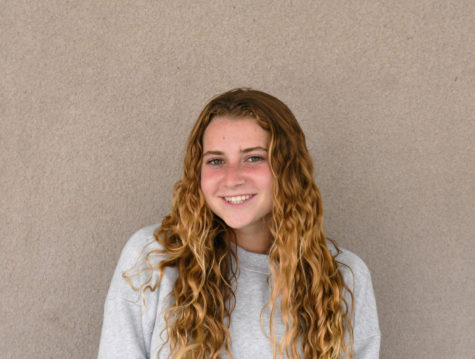Wolverine Pause gains popularity
March 17, 2023
Behind the microphone in the Broadcast Journalism classroom, and behind the counter at Rubio’s Coastal Grill, Malayna Hernandez (12) and Roury Fitzpatrick (11) work seamlessly together, balancing their efforts and ideas to create a tangible product, be it a grilled gourmet fish taco, or the Wolverine Pause podcast.
“We’re very comfortable with each other,” Hernandez said. “We’re close enough to go back and forth in a mature way, [so] it’s not just one person’s ideas and the other person is helping, like, we’re very much working together and intertwining [our] ideas.”
The concept of creating a Westview podcast was initially presented to Hernandez and Fitzpatrick by Newscast adviser Robert Casas earlier this year. Since 2018, Westview’s broadcast journalism program has worked closely with Student Reporting Labs, a branch of PBS that seeks to broaden the accessibility of media production in schools. Student Reporting Labs achieves this by creating lesson plans, providing equipment, and giving student journalists opportunities to be featured on their channel by releasing prompts and taking submissions of student-generated content to be incorporated in their posts.
“[Working with PBS] has made such a huge difference [for our program],” Casas said. “They have a curriculum that is made by professionals in the industry, and [now that we have been] added as one of their programs, it has opened the door to all sorts of opportunities [of projects that] we can produce for them. We’ve had them fly out from Washington, DC to work with us here, and in May we’re going to be presenting at their big national meeting in San Diego.”
Earlier this year, one such production opportunity arose, and Westview’s broadcast journalism team worked on an episode of On Our Minds, Student Reporting Labs’ podcast. The episode was called “How to choose a path after high school,” and followed students going through the process of graduating and navigating life post high school. After this experience, Hernandez and Fitzpatrick knew that they wanted to continue creating podcast content, and fill a journalism niche that had not yet been fully explored at Westview.
“We’re supposed to keep up with the industry trends and everything,” Casas said. “So I’ve been thinking for a while ‘why aren’t we doing a podcast?”
According to Fitzpatrick, she hadn’t had much experience with podcasts, even as a listener, prior to working on the episode for On Our Minds.
“I never really listened to podcasts myself, [but] when we [did the initial] episode, I thought, maybe I should listen to some and kind of see what they’re like,” Fitzpatrick said. “[I thought] ‘Oh, this is interesting.’ It’s more fun than I thought it would be.”
Fitzpatrick takes inspiration from Emma Chamberlain’s conversational style in her podcast, Everything Goes’. Hernandez also cited a conversational style as being an asset when recording a podcast episode, as it is important to ensure that the interviewees are comfortable, and that the audience is engaged.
“[Hernandez and Fitzpatrick] are really good at being able to tackle a sensitive subject [or] tackle a more complex issue and still have this very casual feel to it,” Casas said. “They got that immediately. [They have the] podcast voice—you really can’t get into a serious news tone, or you can lose your audience—making it more casual and the call-and-response kind of back-and-forth between the two of them [works really well].”
For the hosts of Wolverine Pause, it is essential to put themselves in potentially uncomfortable situations for the sake of the podcast.
“Sometimes I’m a little bit guarded, but sometimes I like to be more out there,” Fitzpatrick said. “I think especially when it comes to the podcasts, you have to be outgoing, especially to ask people that you don’t know to be interviewed.”
With the overarching theme of Wolverine Pause being mental health and wellness, some of the topics that Hernandez and Fitzpatrick want to tackle can be difficult for students to feel comfortable opening up about. That being the case, they actively work to ensure that students will feel comfortable opening up to them. According to Hernandez, it was somewhat difficult to get interviewees for their last episode, which centered around the effect of high school relationships on mental health.
“[That topic] is kind of awkward to talk about, so going into interviews I think that both myself and [Fitzpatrick] were a little nervous, but the fact that it’s awkward to talk about and the fact that it’s less talked about inspired us to do something different,” Hernandez said.
Though the tone of each episode may seem easygoing and impromptu, a month of planning goes into creating every new installment of Wolverine Pause. Hernandez and Fitzpatrick produce each episode from the ground up, starting with a central idea. Once the topic for the episode has been decided, they look for potential interviewees, while also creating a map of how they would like the episode to go. They outline the questions that they will ask their interviewees, possible responses that might come up, follow-ups, and where they would like to transition with a voice-over of the two of them. Once they have recorded all of the audio for an episode, they are responsible for editing the clips together, creating a cohesive final product.
According to Casas, the longform content made possible by the podcast format has not only allowed a wider breadth of topics to be covered, but also garnered an international audience.
“We get the stats on our podcast as part of the system that we use and, [we have] listeners in France, Germany, the U.K., and all across the country. It’s picked up, and it’s still picking up,” Casas said.
Currently, Wolverine Pause has had several hundred listeners, and the team is hoping that that number only grows. You can find Wolverine Pause on Spotify, Apple Podcasts, and various other podcast providers. The next episode will be coming out later this month, and covering the transition from middle school to high school.


